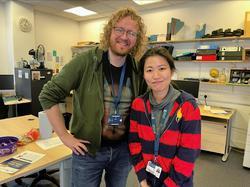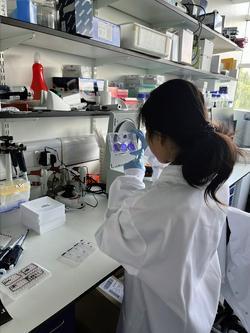Meet Vacation Studentships recipient: Sora Ogawa
What is your name and institution?

My name is Sora, and I am a veterinary student just about to start my third-year at the University of Glasgow. This summer, I had the wonderful opportunity to undertake a summer research project on feline calicivirus at the Centre for Virus Research (CVR) here at the University of Glasgow. I’m delighted to share the insights gained from this rewarding experience, which would not have been possible without the support of the Harry Smith Vacation Studentship.
Please can you tell us why you applied for the Harry Smith Vacation studentship?
When I applied for the Harry Smith Vacation Studentship, I intended to gain hands-on research experience in a microbiology laboratory. As someone who aspires to become a clinical veterinary researcher; I recognised that this studentship would offer a unique opportunity to become deeply involved within the research environment and develop critical laboratory skills. My previous research focused on neurodevelopmental disorders during my previous degree in Animal Sciences, so venturing into virology with my background in veterinary medicine has been exciting and challenging.
How did you feel when you found out your application was successful?
When I found out that my application for the studentship had been successful, I was thrilled that I would officially be a part of a microbiology lab. It also marked a significant step towards my academic journey into practical research with real-world implications, and I couldn’t wait to start.
How would you go-about explaining your research to someone who may not understand science?
My research focuses on feline calicivirus (FCV), a virus affecting cats that usually causes symptoms like mild ‘cat flu’ and other symptoms such as cold sores around the mouth and paws. However, there are more dangerous and prolific strains of FCV, termed virulent systemic FCV (VS-FCV), which can cause severe illness and even death in vaccinated cats. Currently, there are no vaccines that can give cats protection against these highly dangerous strains. Current vaccines available in Europe use weakened or modified strains of FCV, but due to FCV having a highly flexible genome, these vaccines can potentially regain its ability to spread and cause disease, especially in unvaccinated cat populations. Additionally, vaccinated cats can shed the virus for up to 30 days after being vaccinated, which can contribute to the spread of disease.
My research aims to address this problem by identifying key amino acids within the viral polymerase; an enzyme that helps the virus replicate its genome, and introducing mutations at these key sites to create a virus with increased fidelity, making it less likely to revert to a more virulent form. By identifying these mutations, we aim to develop a vaccine with improved genetic stability, that is less likely to revert to a harmful form, thus contributing to safer FCV vaccines.

What have you learnt from your experience?
Throughout this summer, I have learnt a repertoire of laboratory techniques and the many challenges of conducting research. One of the most important lessons, though it may seem obvious, has been understanding that research is not always straightforward. Experiments can yield unexpected results, requiring problem-solving skills and the ability to quickly change the experimental plan based on new information. Yet, this trial-and-error process is a critical aspect of research, and learning to navigate these challenges has been an invaluable learning experience.
How do you think this vacation will help your career progression?
The skills and knowledge I’ve gained this summer will undoubtedly advance my career in veterinary medicine and research. This project has provided me with practical experience and insights, which will be crucial as I continue to pursue my goals in clinical veterinary research.
Why is support, such as this grant provided by the Microbiology Society, so important?
Support from grants such as the Harry Smith Vacation Studentship are essential for students like me who are passionate about research. These grants offer more than just financial assistance: they provide students with an opportunity to deeply engage with a subject of interest; contribute meaningfully to the scientific community; and gain hands-on research experience that is crucial for future career development. For me, this studentship has solidified my interest in veterinary research and has shown me the profound impact of research that can have on improving animal health and well-being.
The Harry Smith Vacation Studentship has been a transformative experience, and I am excited to carry forward the skills and knowledge I’ve gained from this project into my future endeavours.
The Harry Smith Vacation Studentship has been a transformative experience. This studentship has solidified my interest in veterinary research and has shown me the profound impact of research that can have on improving animal health and well-being.
